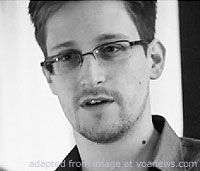Snowden and Moscow: the real debate is elsewhere

(Moscow News – themoscownews.com – Natalia Antonova, Acting Editor-in-Chief – June 24, 2013) Whatever you think about whistleblower Edward Snowden’s future plans (or, indeed, his whereabouts) – you may be falling for a neat trick all of the same.
While all of us have been busy discussing Snowden – why he did what he did, his personality, whether or not he’s different from Bradley Manning, whether or not he has ever donned a blond wig – we are missing the fact that the NSA wants us to talk about him at the expense of greater problems just about now.
The focus on Snowden is understandable. An individual life is not any less important than an idea. The fact that Snowden’s fate may also have a sizeable impact on already strained relations between the United States and Russia also cannot be overlooked.
Yet we are also discussing Snowden simply because he is identifiable – he has allowed us to put a face on the surveillance state. That state itself is difficult to comprehend. The idea that thousands of Americans with security clearance may have access to your e-mails is both hard to swallow – and incredibly abstract.
What Snowden has done is, in effect, akin to an action performed by the heroes in Timur Bekmambetov’s “Nightwatch” – which is “exiting the twilight,” i. e. stepping out of the shadows, i. e. suddenly making himself and the organization behind him plainly visible. It’s a major, symbolic act and it also gives us very little ideas on how to handle the revelations about the NSA’s surveillance program. Because it’s not just NSA vs. Snowden. It’s NSA vs. basic human dignity.
Unlike a lot of my peers, I don’t fuss much about privacy. I figured that for most of us, it ended with the Internet and Anonymous being able to hack all of your computers – and get 50 pizzas delivered to your house while they’re at it.
At the same time, however, I remain deeply disturbed by the amount of power concentrated in the NSA – particularly at a time when the West is busy lecturing the rest of the world on democracy. Everything we have learned about the surveillance system so far makes it appear as profoundly anti-democratic as to make it laughable. If only because the surveillance revelations are making the entire system of checks and balances in the U.S. government appear to be pointless.
